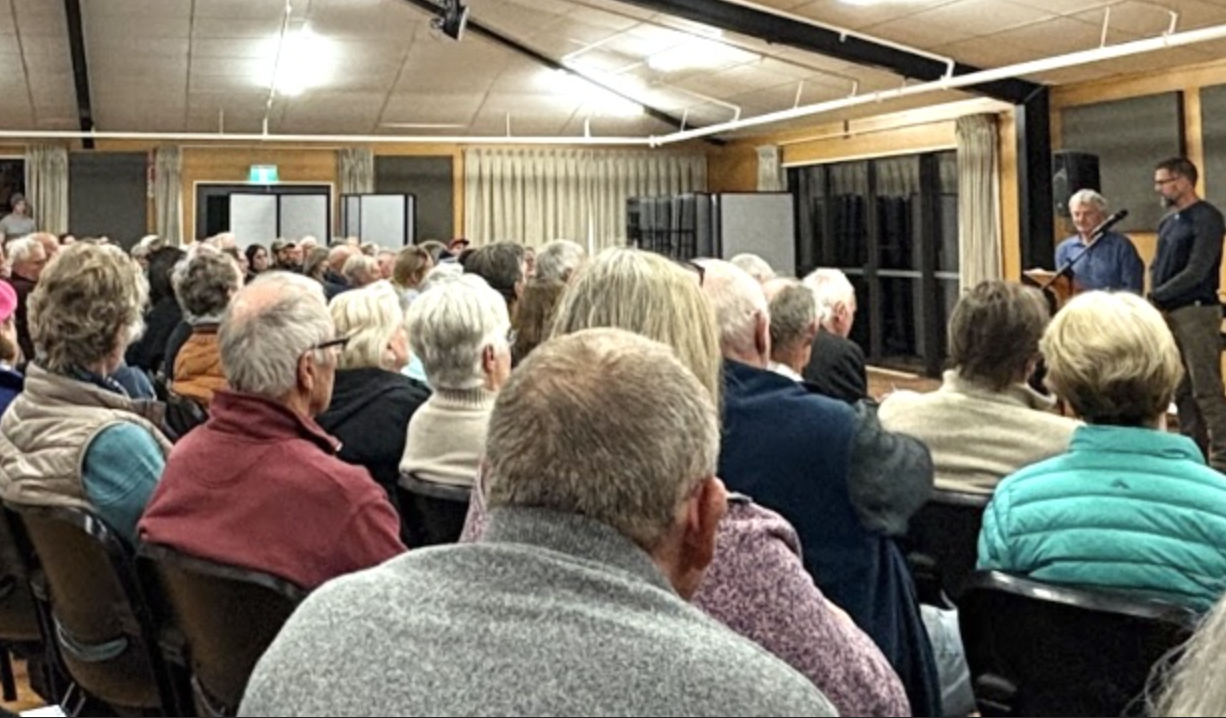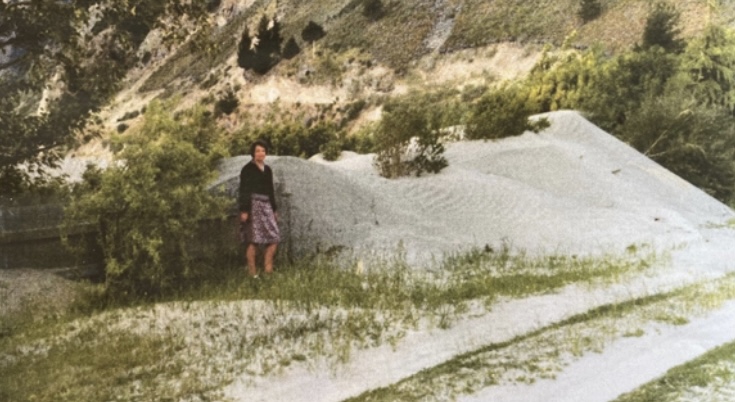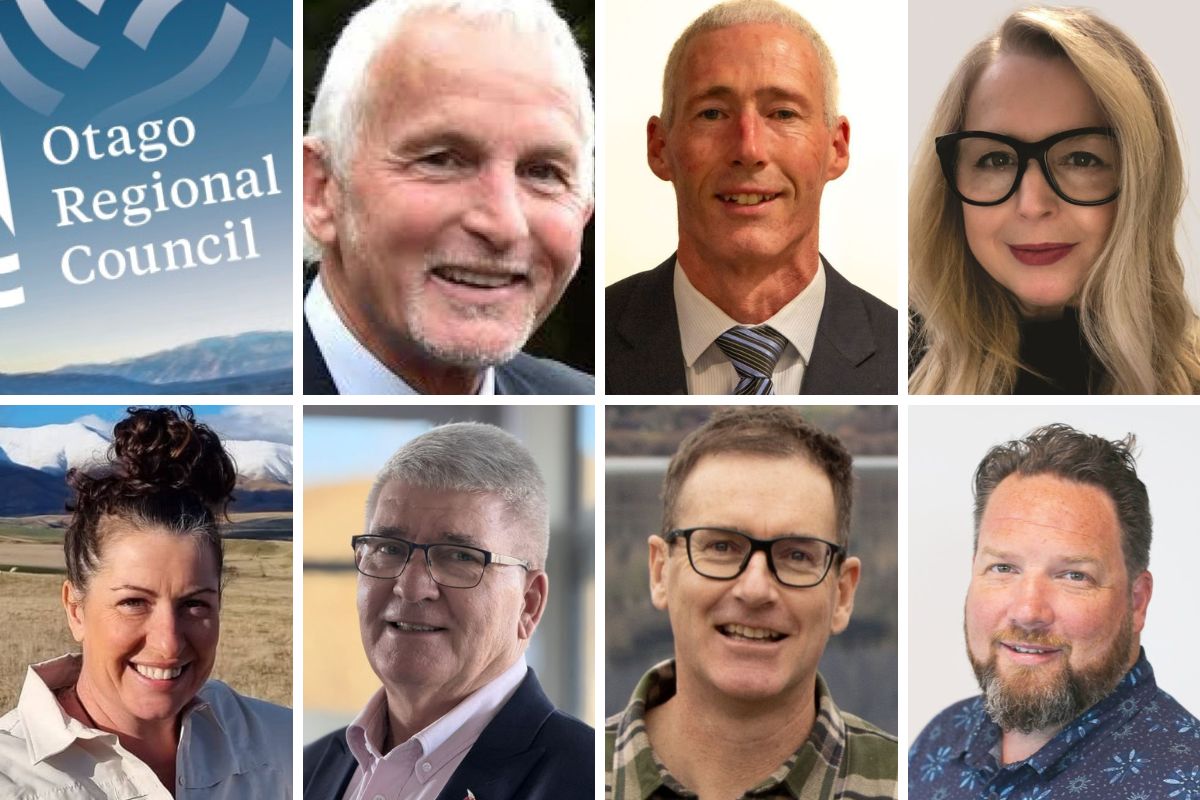Don’t ‘underestimate the fight required’ - Hāwea residents warned
Maddy Harker
19 September 2025, 4:30 AM
 Concerned residents filled the Lake Hāwea Community Centre last night to discuss Contact Energy’s fast-track application to reduce the lake level by as much as six metres. PHOTO: Wānaka App
Concerned residents filled the Lake Hāwea Community Centre last night to discuss Contact Energy’s fast-track application to reduce the lake level by as much as six metres. PHOTO: Wānaka AppLake Hāwea residents presented a united front last night (Thursday September 18) at a public meeting over Contact Energy’s fast-track application to lower the lake level - a move the community says would lead to dust storms, dry bores, and devastate the lake environment.
Otago Regional councillor Michael Laws presented the challenge Lake Hāwea has in front of it as a David-and-Goliath style battle against “a rapacious gentailer who is already arguing this project is in the national interest”.
Michael said Contact Energy, which operates the Lake Hāwea hydro dam, would present the project as “Hāwea versus the rest of New Zealand” and cite national benefits to energy provision and affordability despite the enormous local cost.
“Do not underestimate for a moment the fight and the battle we will be required collectively to embrace,” he told a packed Lake Hāwea Community Centre.
Contact Energy’s application to reduce the lake’s normal operating range by up to six metres has been submitted under the government’s new fast-track approvals process and Todd and Walker Law principal Rosie Hill told the meeting the application is currently at the referral stage - an initial test to determine if it qualifies under the legislation.
If it passes that threshold, Contact Energy will be invited to submit a full application that will be assessed under what she described as a “fundamentally different framework to the Resource Management Act”.
“The Fast Track Approval Act has a key purpose around facilitating regional and national infrastructure and development projects,” Rosie said.
“It’s not balanced on environmental effects.”
Past experiences with changing lake levels have left scars. Farmer Jerry Rowley described the “scene of disaster” in the 1970s when low lake levels exposed large areas of lakebed, leading to widespread dust storms that affected the health and morale of residents.

Wind-borne lake sediment at John Creek circa 1978-80 following lowering of Lake Hāwea’s level in 1976. PHOTO: Campbell collection
Guardians of Lake Hāwea Geoff Kernick told the crowd the proposal could disrupt aquatic ecosystems, destroy shoreline vegetation, and degrade lakeside amenity.
“These are costs that would be borne by the community and the environment,” he said.
The most pressing concern for many, however, was the potential effect on the groundwater supply.
A 2023 Otago Regional Council report found if the lake is dropped to 330 metres - as proposed in extreme cases - the lake would become disconnected from the aquifer, likely resulting in a significant decline in groundwater levels and widespread bore failure.
“We will all run dry, in simple terms,” Devon Dairies farmer and meeting organiser Erynne Fildes said.
“So we all need to unite as a group and lobby council and central government to have this stopped from heading down the fast-track route.”
A last-minute appearance from two Contact Energy representatives did little to ease concerns.
Contact Energy head of hydro generation Boyd Brinsdon said the lake level might be lowered only “maybe once every three years”; claimed it would not be lowered to its proposed minimum; and compared the proposal to an insurance policy.
But the vague assurances did not go down well, and Wānaka Upper Clutha Community Board chair Simon Telfer interjected with a pointed response.
“You are continuing to undermine your own argument by oscillating backwards and forwards with the ‘trust me, but don’t worry, we’ll never need it, but we might need it’,” he said.
“You either need it or you don’t."
Brinsdon also suggested the proposal couldn’t proceed if it compromised local drinking water - but when pressed, he would not confirm whether Contact would withdraw the plan on that basis.
Across the evening, different speakers - farmers, elected representatives, and members of community groups - encouraged the community to write to MPs, sign up to a mailing list, and coordinate action.
Elected representatives from Otago Regional Council and Queenstown Lakes District Council also said they would contribute in any way they could.






